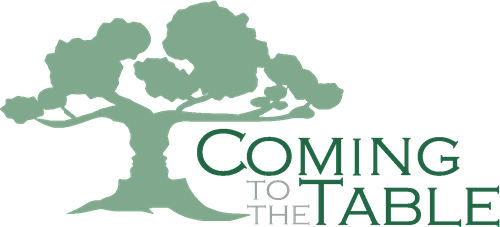Recommended Reading for Further Study after LBRH
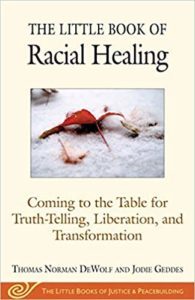 The Little Book of Racial Healing is a little book about a very BIG topic. It serves as a brief introduction to the Coming to the Table Approach to racial healing. We encourage readers to continue your research; to expand your understanding and enhance your effectiveness in this important work. We offer the following resources, with chapter by chapter relevance, to get you started. This list is expanded from what is included in the book.
The Little Book of Racial Healing is a little book about a very BIG topic. It serves as a brief introduction to the Coming to the Table Approach to racial healing. We encourage readers to continue your research; to expand your understanding and enhance your effectiveness in this important work. We offer the following resources, with chapter by chapter relevance, to get you started. This list is expanded from what is included in the book.
(NOTE: if you choose to purchase any of the books below from Amazon, and do so by clicking on the provided link, a small portion of your purchase will be donated by Amazon to Coming to the Table)
Chapter 2: Trauma Awareness and Resilience
-
The Little Book of Trauma Healing, by Carolyn Yoder (order here)
- The book at the core of the STAR program (Strategies for Trauma Awareness & Resilience) and CTTT Approach. Also check out Carolyn’s Peace After Trauma website, with resources, webinars and STAR-basics self-paced course
-
The Body Keeps the Score, by Bessel van der Kolk (order here)
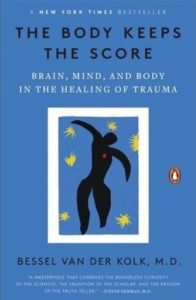 s both body and brain, compromising sufferers’ capacities for pleasure, engagement, self-control, and trust. He explores innovative treatments—from neurofeedback and meditation to sports, drama, and yoga—that offer new paths to recovery by activating the brain’s natural neuroplasticity.
s both body and brain, compromising sufferers’ capacities for pleasure, engagement, self-control, and trust. He explores innovative treatments—from neurofeedback and meditation to sports, drama, and yoga—that offer new paths to recovery by activating the brain’s natural neuroplasticity. -
In an Unspoken Voice, by Peter A. Levine (order here)
- Levine draws on his broad experience to explain the nature and transformation of trauma in the body, brain and psyche. Based on the idea that trauma is neither a disease nor a disorder, but rather an injury caused by fright, helplessness and loss that can be healed. Blending the latest findings in biology, neuroscience and body-oriented psychotherapy to show that when we bring together animal instinct and reason, we can become more whole human beings.
-
The New Jim Crow: Mass Incarceration in the Age of Colorblindness, by Michelle Alexander (order here)
- By targeting black men through the War on Drugs and decimating communities of color, the U.S. criminal justice system functions as a contemporary system of racial control—relegating millions to a permanent second-class status.
-
The Ghost in Your Genes (Click Here to watch this BBC documentary online)
- This 50-minute documentary explores the new field of epigenetics, and the idea that genes have ‘memory’. That the lives of your grandparents – the air they breathed, the food they ate, even the things they saw – can directly affect you, decades later, despite your never experiencing these things yourself. And that what you do in your lifetime could in turn affect your grandchildren.
-
Click Here for a brief overview of the fundamentals of epigenetics
Chapter 3: Restorative Justice
-
The Little Book of Restorative Justice, by Howard Zehr (order here)
- Core book for CTTT Approach. Howard Zehr, considered the grandfather of Restorative Justice, is known worldwide for his pioneering work in transforming understandings of justice. This Little Book includes workable principles and practices for making Restorative Justice possible in this seminal book on the RJ movement.
-
Restorative Justice in Urban Schools: Disrupting the School to Prison Pipeline, by Anita Wadhwa (order here)
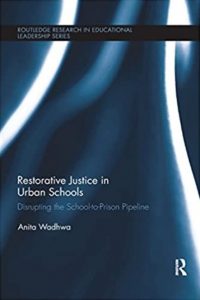 The school-to-prison pipeline is often the path for marginalized students, particularly black males, who are three times as likely to be suspended as white students. Wadhwa provides an ethnographic portrait of how educators can implement restorative justice to build positive school cultures and address disciplinary problems in a more corrective and less punitive manner.
The school-to-prison pipeline is often the path for marginalized students, particularly black males, who are three times as likely to be suspended as white students. Wadhwa provides an ethnographic portrait of how educators can implement restorative justice to build positive school cultures and address disciplinary problems in a more corrective and less punitive manner.
-
Peacemaking Circles: From Crime to Community, by Kay Pranis, Barry Stuart, and Mark Wedge (order here)
- Based on indigenous teachings combined with current research in conflict resolution, the Circle process described here builds an intentionally safe space where we can bring our best selves to some of our most difficult conversations.
-
The Restorative Practices Handbook: for Teachers, Disciplinarians and Administrators, by Bob Costello, Joshua Wachtel and Ted Wachtel (order here)
- A practical guide for educators interested in implementing restorative practices, an approach that proactively builds positive school communities while dramatically reducing discipline referrals, suspensions and expulsions.
-
A Restorative Justice Reader, edited by Gerry Johnstone (order here)
- Brings together carefully chosen extracts from the most important and influential contributions to the literature of restorative justice, accompanying these with an informative commentary providing context and explanation.
-
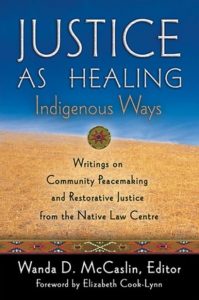 Justice as Healing: Indigenous Ways, Writings on Community Peacemaking and Restorative Justice from the Native Law Centre, edited by Wanda McCaslin (order here)
Justice as Healing: Indigenous Ways, Writings on Community Peacemaking and Restorative Justice from the Native Law Centre, edited by Wanda McCaslin (order here)- Restorative justice traces its roots to Indigenous traditions worldwide, yet few books in the field present Indigenous voices speaking directly about Native ways of responding to harms. This book does just that.
-
Returning to the Teachings: Exploring Aboriginal Justice, by Rupert Ross (order here)
- About Aboriginal justice and much more, speaking not only to our minds, but also to our hearts and spirits. Above all, this book stands as a search for the values and visions that give life its significance and that any justice system, Aboriginal or otherwise, must serve and respect.
Chapter 4: Uncovering History
-
A People’s History of the United States, by Howard Zinn (order here)
- The classic, must-read: the story of the United States from the point of view of—and in the words of—America’s women, factory workers, African-Americans, Native Americans, the working poor, and immigrant laborers.
-
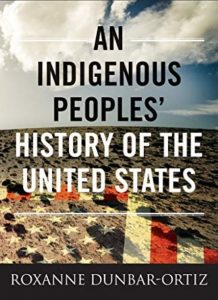 An Indigenous People’s History of the United States, by Roxanne Dunbar-Ortiz (order here)
An Indigenous People’s History of the United States, by Roxanne Dunbar-Ortiz (order here)- The first history of the United States told from the perspective of indigenous peoples, challenging the founding myth of the U.S. and shows how policy against the Indigenous peoples was colonialist and designed to seize the territories of the original inhabitants, displacing or eliminating them.
-
A Brief History of Everyone Who Ever Lived: The Human Story Retold Through Our Genes, by Adam Rutherford (order here)
- This book will upend your thinking. Geneticists have suddenly become historians, and the hard evidence in our DNA has blown the lid off what we thought we knew. Genomics is completely rewriting the human story—including the complete interconnectedness of us all.
-
Stamped from the Beginning, by Ibram X. Kendi (order here)
- How racist ideas were created, spread, and deeply rooted in American society. Kendi argues that racist ideas have a long and lingering history, one in which nearly every great American thinker is complicit.
-
The Cross & the Lynching Tree, by James Cone (order here)
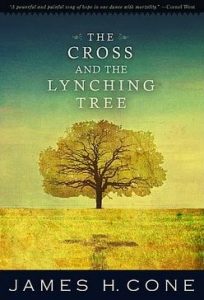 The cross and the lynching tree are the two most emotionally charged symbols in the history of the African American community. Theologian James H. Cone explores these symbols and their interconnection in the history and souls of black folk.
The cross and the lynching tree are the two most emotionally charged symbols in the history of the African American community. Theologian James H. Cone explores these symbols and their interconnection in the history and souls of black folk.
-
The Family Tree: A Lynching in Georgia, a Legacy of Secrets, and My Search for the Truth, by Karen Branan (order here)
- A small Southern town steeped in racial tension and bound by powerful family ties. A searing examination of the violence that occurred on that awful day in 1912—the echoes of which still resound today—and the knowledge that it is only through facing our ugliest truths that we can move forward to a place of understanding.
-
Slavery by Another Name, by Douglas A. Blackmon (order here)
- Brings to light one of the most shameful chapters in American history—an “Age of Neoslavery” that thrived from the aftermath of the Civil War through the dawn of World War II.
-
Sundown Towns, by James Loewen (order here)
- From the author of Lies My Teacher Told Me, here’s the story of 1,000’s of “sundown towns”—almost exclusively white towns where the unspoken rule was that blacks could not live there—that cropped up throughout the twentieth century, most located outside the South.
-
When Affirmative Action was White, by Ira Katznelson (order here)
- Fundamentally recasts our understanding of twentieth-century American history and demonstrates that all the key programs passed during the New Deal and Fair Deal era of the 1930s and 1940s were created in a deeply discriminatory and racist manner.
-
The Color of Law: A Forgotten History of How Our Government Segregated America, by Richard Rothstein (order here)
- Exposes how American governments deliberately imposed racial segregation on metropolitan areas nationwide.
Chapter 5: Making Connections
-
The Healing Art of Storytelling, by Richard Stone (order here)
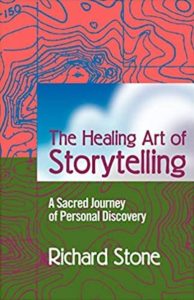 Storytelling as a tool of communicating, learning, and healing has been diminished by television and other cultural forces. Stone describes the devastating effects, and offers ideas for creating a storytelling tradition that we can use to transform our families, our friendships, and ourselves. You will gain a deeper sense of integrity, purpose, and direction and, most importantly, see the story of your life in a new light.
Storytelling as a tool of communicating, learning, and healing has been diminished by television and other cultural forces. Stone describes the devastating effects, and offers ideas for creating a storytelling tradition that we can use to transform our families, our friendships, and ourselves. You will gain a deeper sense of integrity, purpose, and direction and, most importantly, see the story of your life in a new light.
-
Microaggressions in Everyday Life: Race, Gender, and Sexual Orientation, by Derald Wing Sue (order here)
- An insightful look at the various kinds of microaggressions and their psychological effects on both perpetrators and their targets, with realistic and optimistic guidance for combating—and ending—microaggressions in our society.
-
The Four Agreements: A Practical Guide to Personal Freedom, by Don Miguel Ruiz (order here)
- Most everyone has heard about this book. Have you read it? Learn the source of self-limiting beliefs that rob us of joy and create needless suffering. Based on ancient Toltec wisdom, The Four Agreements offer a powerful code of conduct that can rapidly transform our lives to a new experience of freedom, true happiness, and love in relationships with others.
-
The Little Book of Dialogue for Difficult Subjects, by Lisa Schirch and David Campt (order here)
- Teaching people in conflict to listen to each other, affirm their common ground, and explore their differences in a safe environment.
-
The Little Book of Transformative Community Conferencing: A Hopeful, Practical Approach to Dialogue, by David Anderson Hooker (order here)
- A hopeful, accessible approach to dialogue that will prove valuable and timely to mediators, restorative justice practitioners, community organizers, as well as leaders of peacebuilding and change efforts. It presents an important, stand-alone process, an excellent addition to the study and practice of strategic peacebuilding, restorative justice, conflict transformation, trauma healing, and community organizing.
Chapter 6: Circles, Touchstones, and Values
-
The Little Book of Circle Processes, by Kay Pranis (order here)
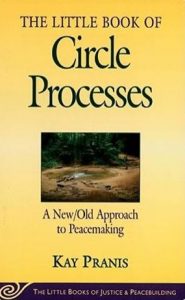 Foundational Book in CTTT Approach. Our ancestors gathered around a fire in a circle, families gather around their kitchen tables in circles, and now we are gathering in circles as communities to create racial healing.
Foundational Book in CTTT Approach. Our ancestors gathered around a fire in a circle, families gather around their kitchen tables in circles, and now we are gathering in circles as communities to create racial healing.
-
Calling the Circle: The First and Future Culture, by Christina Baldwin (order here)
- In this simple, profound practice, participants sit in a circle, pass a talking piece from person to person, and speak and listen from the heart. Includes detailed instructions and suggestions for getting started, setting goals, and solving disagreements safely and respectfully.
-
Wild & Wise: Sacred Feminine Meditations for Women’s Circles & Personal Awakening, by Amy Bammel Wilding (order here)
- A collection of guided meditations that beckon you to explore the powerful realm of symbolism and archetypes, inviting you to access your wild and wise inner knowing. Suitable for reflective reading, or to facilitate healing and empowerment for women who gather in red tents, moon lodges, women’s circles and ceremonies.
-
Heart of Hope: A Guide for Using Peacemaking Circles to Develop Emotional Literacy, Promote Healing & Build Healthy Relationships, by Carolyn Boyles-Watson, and Kay Pranis (order here)
- Provides specific formats for conducting effective Circles around developing emotional literacy and building healthy relationships. The book is being used extensively in schools by teachers and administrators as well as in health care facilities and elder abuse programs.
-
Circle Forward: Building a Restorative School Community, by Carolyn Boyles-Watson, and Kay Pranis (order here)
- A resource and implementation guide designed to help teachers incorporate the practice of circles into the everyday life of schools.
Chapter 7: Working Toward Healing
-
Mindful of Race: Transforming Racism from the Inside Out, by Ruth King (order here)
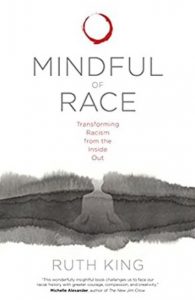 “Racism is a heart disease and it’s curable.” A topic seldom addressed in meditation instruction, this revered teacher takes to her pen to shine a compassionate, provocative, and practical light into a deeply neglected and world-changing domain profoundly relevant to all of us.
“Racism is a heart disease and it’s curable.” A topic seldom addressed in meditation instruction, this revered teacher takes to her pen to shine a compassionate, provocative, and practical light into a deeply neglected and world-changing domain profoundly relevant to all of us.
-
On Apology, by Aaron Lazare (order here)
- One of the most profound interactions that can occur between people, apologies have the power to heal humiliations, free the mind from deep-seated guilt, remove the desire for vengeance, and ultimately restore broken relationships.
-
Clean, by Alejandro Junger, M.D. (order here)
- As Bessel van der Kolk clearly shows in his book listed above, The Body Keeps the Score when it comes to trauma. Clean offers a program to restore the body’s natural ability to heal itself, while recognizing the profound connection among body, mind and spirit; contributing to a holistic perspective on self-care and healing.
-
Radical Forgiveness, by Colin Tipping (order here)
- Could there be a divine purpose behind everything that happens? If you’re willing to embrace this possibility, every aspect of your life can change. Step-by-step instruction in what begins as a healing process, and culminates in a paradigm-shifting path to awakening.
-
Zero Limits (Hawaiian healing practice of Ho’oponopono), by Joe Vitale and Ihaleakala Hew Len, PhD (order here)
- Incorporating love, apology, forgiveness and gratitude to awaken and heal ourselves and humanity.
-
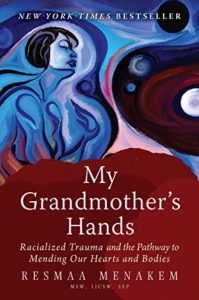 My Grandmother’s Hands: Racialized Trauma and the Pathway to Mending Our Hearts and Bodies, by Resmaa Menakem (order here)
My Grandmother’s Hands: Racialized Trauma and the Pathway to Mending Our Hearts and Bodies, by Resmaa Menakem (order here)- The body is where our instincts reside and where we fight, flee, or freeze, and it endures the trauma inflicted by the ills that plague society, including the damage caused by racism. This destruction will continue until Americans learn to heal the generational anguish of white supremacy, which is deeply embedded in all our bodies.
-
Free Your Mind: An African American Guide to Meditation and Freedom, by Cortez R. Rainey (order here)
- Although more and more Americans are practicing meditation, it is still relatively rare among African Americans. Cortez Rainey does something about this by speaking directly to African Americans about meditation. Free Your Mind presents meditation as a path that African Americans can use to develop a mind free of limiting thoughts. As you journey, you will bring forth more of your “inherent goodness, genius, and potential.” A Nautilus Book Award Winner, Next Generation Indie Book Award Finalist, and NAACP Image Award Nominee.
-
The CTTT Mindfulness Working Group has developed a significant list of resources for Mindfulness and Meditation practices
Chapter 8: Taking Action
-
The Coming to the Table Reparations Guide (free download here)
- Over 3 years, the CTTT Reparations Working Group met regularly, researched, and gathered input to develop a document that would inspire and provide guidance for European Americans desiring to initiate personal, community, societal and national reparations. Free to download and share widely in your community and social media outlets.
-
The White Ally Toolkit, by David Campt (order here)
- Dismantling racism one conversation at a time. Buy the toolkit. Use the many resources on the website. Bring David to your community. His workshops are highly recommended. A great resource!
-
Just Mercy: A Story of Justice and Redemption, by Bryan Stevenson (order here)
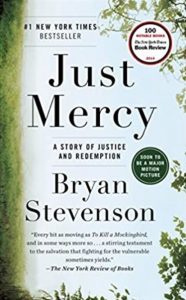 #1 New York Times bestseller; a powerful true story about the potential for mercy to redeem us, and a clarion call to fix our broken system of justice. Soon to be a major motion picture starring Michael B. Jordan and Jamie Foxx
#1 New York Times bestseller; a powerful true story about the potential for mercy to redeem us, and a clarion call to fix our broken system of justice. Soon to be a major motion picture starring Michael B. Jordan and Jamie Foxx
-
What Does it Mean to be White? Developing White Racial Literacy, Robin DiAngelo (order here)
- Speaking as a white person to other white people, DiAngelo takes readers through an analysis of white socialization. Weaving research, analysis, stories, images, and familiar examples, she provides the framework needed to develop white racial literacy. She describes how race shapes the lives of white people, explains what makes racism so hard to see, identifies common white racial patterns, and speaks back to popular narratives that work to deny racism.
-
Uprooting Racism: How White People Can Work for Racial Justice, Paul Kivel (order here)
- Practical tools and advice on how white people can work as allies for racial justice, engaging readers through questions, exercises, and suggestions for action, and includes a wealth of information about specific cultural groups such as Muslims, people with mixed heritage, Native Americans, Jews, recent immigrants, Asian Americans, and Latino/as.
-
Why Are All The Black Kids Sitting Together in the Cafeteria? by Beverly Daniel Tatum, PhD (order here)
- The classic, bestselling book on the psychology of racism–now fully revised and updated. Essential reading for anyone seeking to understand the dynamics of race in America.
-
The Debt: What America Owes to Blacks, Randall Robinson (order here)
- An impassioned call to our nation to educate all Americans about the history of Africa and its people. Robinson makes a persuasive case for the debt white America owes blacks, and the debt blacks owe themselves.
-
Atonement and Forgiveness: A New Model for Black Reparations, Roy L. Brooks (order here)
- Reframing one of the most important, controversial, and misunderstood issues of our time, here is a passionate, convincing case that only with a spirit of heightened morality, identity, egalitarianism, and restorative justice can genuine racial reconciliation take place in America.
-
Center for Justice & Peacebuilding (CJP) at Eastern Mennonite University (Learn more here)
- CJP offers weeklong trainings session in STAR (Strategies for Trauma Awareness & Resilience) multiple times each year. The Summer Peacebuilding Institute at EMU offers classes each May/June in restorative justice, circle processes, conflict transformation, building resilience, story-telling, playback theater, building restorative organizations, and more.
Chapter 9: Liberation and Transformation
-
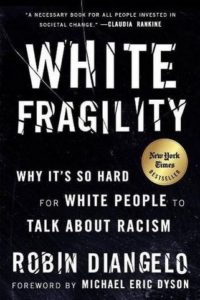 White Fragility: Why It’s So Hard for White People to Talk About Racism, Robin DiAngelo (order here)
White Fragility: Why It’s So Hard for White People to Talk About Racism, Robin DiAngelo (order here)- The NY Times best-selling book exploring the counterproductive reactions white people have when their assumptions about race are challenged, and how these reactions maintain racial inequality. Michael Eric Dyson calls it a “vital, necessary, and beautiful book.” DiAngelo examines how white fragility develops, how it protects racial inequality, and what we can do to engage more constructively.
-
Well, That Escalated Quickly: Memoirs and Mistakes of an Accidental Activist, Franchesca Ramsey (order here)
- From veteran video blogger and star of MTV’s Decoded, Franchesca Ramsey explores race, identity, online activism, and the downfall of real communication in the age of social media rants, trolls, and call-out wars. She uses her own experiences as an accidental activist to explore the many ways we communicate with each other–from the highs of bridging gaps and making connections to the many pitfalls that accompany talking about race, power, sexuality, and gender in an unpredictable public space…the internet.
-
Privilege, Power, and Difference, Allan G. Johnson (order here)
- A powerful tool for examining systems of privilege and difference in our society; linking theory with engaging examples that enable readers to see the underlying nature and consequences of privilege and their connection to it. This book has been used across the country, both inside and outside the classroom, to shed light on issues of power and privilege.
-
Tears We Cannot Stop: A Sermon to White America, Michael Eric Dyson (order here)
- A provocative and deeply personal call for change. Dyson argues that if we are to make real racial progress we must face difficult truths, including being honest about how black grievance has been ignored, dismissed, or discounted.
